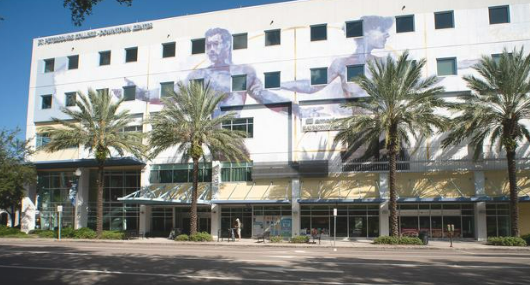
Like their counterparts nationally, many of Florida’s locally governed public colleges experienced enrollment declines before the pandemic that only grew steeper after its onset.
Also like their counterparts, these post-secondary schools, which, like state universities, are coordinated under the jurisdiction of the State Board of Education, have been exploring and adopting strategies to fill their seats.
Valencia College on Florida’s east coast, for example, began offering scholarships to students who failed remote classes they attended during the pandemic, allowing then to repeat the classes on campus as in-person instruction resumed.
Others started “summer bridge” programs to help new students feel more prepared when the fall term starts.
Programs that have gained the most attention are those that reach prospective students before they receive high school diplomas. Those include dual enrollment options that allow students to attend classes on college campuses or take courses from high school faculty members specially trained to teach them, as well as early college high school programs that allow students to earn college credits while completing their high school diplomas.
To facilitate the former, Florida lawmakers in 2021, after years of participation decline among private schools due to prohibitive costs, approved funding to cover tuition and fees for private school students who take dual enrollment classes. (Funding already had been in place for public school students through their school districts, and state law barred colleges from charging home school students who participated.)
The most recent example of the latter is St. Petersburg College in Florida’s Tampa Bay area, which recently announced the opening of its third collegiate high school. The new school will use $2 million in new state funding, and unlike the two existing collegiate high schools, will be open to freshmen.
The first collegiate high school under St. Petersburg College auspices opened as a public charter school of choice in 2004 on the St. Petersburg/Gibbs campus. A cavalcade of honors followed. Newsweek named it one of America’s Top High Schools in 2016, ranking it No. 2 in Florida and No. 55 in the nation. U.S. News & World Report named St. Petersburg Collegiate High School to its list of 2019 Best High Schools.
The new downtown St. Petersburg campus will allow students in grades 9-12 to simultaneously earn a high school diploma, two industry certifications and an associate in science degree. Like the other two collegiate high school campuses, there will be no cost to students for books, fees or tuition.
Starla Metz, St. Petersburg College’s vice president of collegiate high schools, said the college’s newest pre-collegiate program will infuse reading, writing, critical thinking, research and college readiness skills into its curriculum. Juniors and seniors will take part in the collegiate program, where they dual enroll in college classes.
Overall, the school will focus on preparing students for careers in science, technology, engineering and math, commonly referred to as STEM.
Metz recently told St. Pete Catalyst that as technology evolves, STEM education is “absolutely critical” to prepare students for high-paying jobs. Like its counterparts, the new campus in downtown St. Petersburg will offer associate degrees in computer information technology, data systems and business intelligence.
With some additional courses over the summer, graduating seniors can earn their associate in arts degree to continue their education at St. Petersburg College or another Florida college or university.
“We’re really excited because we think STEM is the future, and that’s where our students are going to have the opportunity to have economic mobility for themselves and their families,” Metz said.
Research from the non-profit, non-partisan American Institutes for Research on the impact of early college programs showed a substantial positive impact not only on college enrollment but degree completion each year between the fourth year of high school and six years after expected high school graduation.
The study also found that early college students complete college degrees earlier and faster than those who did not participate.
While some of the nation’s most prestigious universities have celebrated banner years for applications, the pandemic has been hard for most post-secondary institutions. More than 1 million fewer students are enrolled in college now than before the pandemic began. According to data released in January by the National Student Clearinghouse, U.S. colleges and universities saw a drop of nearly 500,000 undergraduate students in the fall of 2021, continuing a historic decline that began the previous fall.
Compared with the fall of 2019, the last fall semester before the coronavirus pandemic, undergraduate enrollment fell a total of 6.6%, representing the largest two-year decrease in more than 50 years.
The nation’s community colleges were hit even harder, with a 13% enrollment drop over the course of the pandemic. But the fall 2021 numbers showed that bachelor’s degree-seeking students at four-year colleges made up about half of the decline among undergraduates.
Researchers found that many students who took a gap year during the pandemic weren’t returning. Speculation was that many were choosing to work as the economy rebounded and jobs became plentiful.
“The phenomenon of students sitting out of college seems to be more widespread. It’s not just the community colleges anymore,” said Doug Shapiro, who leads research at the National Student Clearinghouse and who spoke to NPR about the report.
“That could be the beginning of a whole generation of students rethinking the value of college itself. I think if that were the case, this is much more serious than just a temporary pandemic-related disruption.”
For information about St. Petersburg College’s new STEM collegiate high school located in downtown St. Petersburg, as well as the college’s other two collegiate high school locations, click here.


